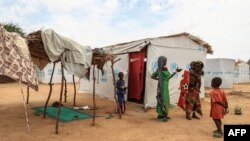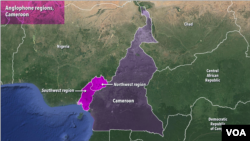Cameroon is marking Boxing Day, the day after Christmas when gifts are traditionally given to the poor, with a nationwide gift drive for internally displaced children. Cameroon's government, churches and aid groups are working together to provide food, books, and school fees to tens of thousands of children displaced by the country's separatist conflict.
More than 300 children displaced by Cameroon’s separatist conflict gathered Monday at the Bandjoun Community Hall in the capital Yaounde to receive Boxing Day gifts.
The day after Christmas is traditionally when people in Britain and Commonwealth countries like Cameroon give gifts to the poor.
While many churches and aid groups on Boxing Day support IDP children with gifts, including one time by first lady Chantal Biya, this year’s was the first to be coordinated nationwide.
Seventeen-year-old Albert Ndip says the $50 he received from the city council will help him register to sit the 2023 general education exam.
"I am very happy for the food, school fees and dresses (clothing) that they have given to us, but I pray that the government should stop the fighting, the killing, and schools should start back in my village so that I can go back there and school," he said.
Ndip in 2018 fled the English-speaking southwestern town of Menji after rebels torched their home and wounded his parents.
He has since lived in a Roman Catholic orphanage in Yaounde while his father, mother, and sister are still in Menji.
Authorities say the Boxing Day gift drive aims to ease suffering for tens of thousands of children displaced by the separatist conflict, now in its fifth year.
Fai Cassian Ndi, Coordinator of the Cameroon Youths Development Organization, said it’s all about bringing smiles to children’s faces.
"Children that have been displaced are living in very deplorable situations,” Ndi said. “We thought it necessary that we could seek assistance and donations from some of our elite and then we get to these children so that some that didn't have anything to eat at all, can have something to eat. When they were coming, you could see on their faces that they were not comfortable, but when they were leaving, we saw smiles on their faces."
Cameroon’s military says the separatists attacked more than 200 government schools between 2017 and 2019, forcing nearly all in the Northwest and Southwest regions to close.
The U.N. says more than 700,000 children have been impacted by the school closures while many remaining in the regions are threatened by violence, kidnapping, early marriage or being recruited into armed groups.
For the children that flee, Cameroon authorities say most are not able to afford education and struggle to fit in.
Wilfred Wambeng Ndong, the highest government official in charge of basic education in Cameroon’s Northwest region, said the conflict’s psychological impact on children is harrowing.
"The children in the Northwest region have gone through very disturbing times due to insecurity, and once displaced, you bear with me, you already have some psychological instability,” he told VOA via a messaging app from Bamenda, capital of the Northwest region. “Some of the children found themselves in new environments and in new schools and they had to grapple with the new environment and performance. That was much more trouble for the children."
Cameroon’s separatists launched their rebellion in 2017, seeking to break off the country’s Northwest and Southwest regions, where English is the majority language, from the rest of Cameroon, where most speak French.
The U.N. says more than 3,500 people have since been killed in the conflict and 750,000 displaced.





